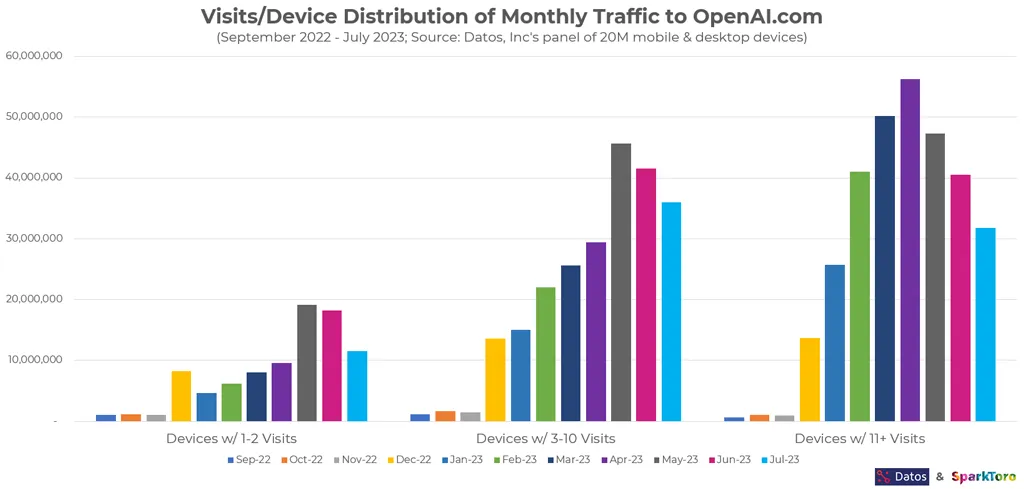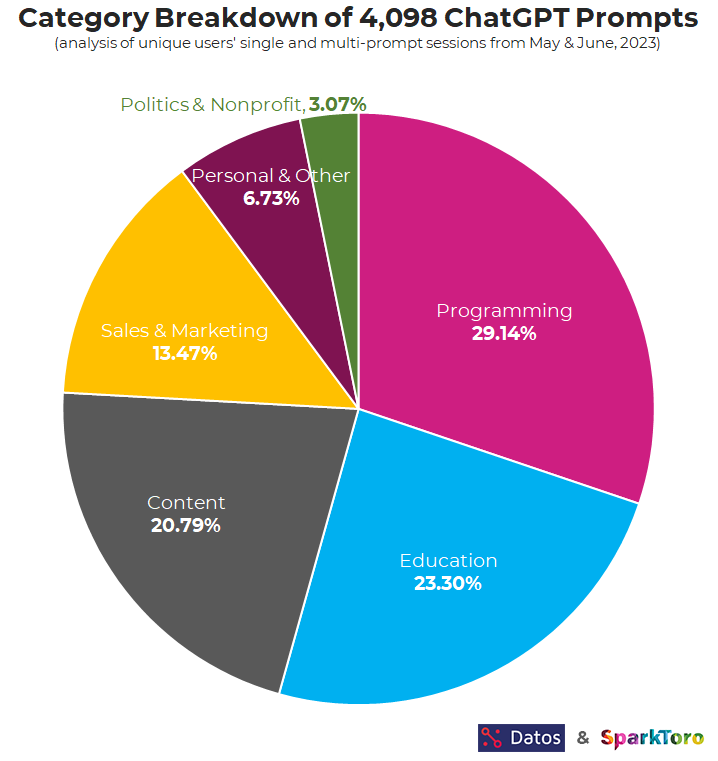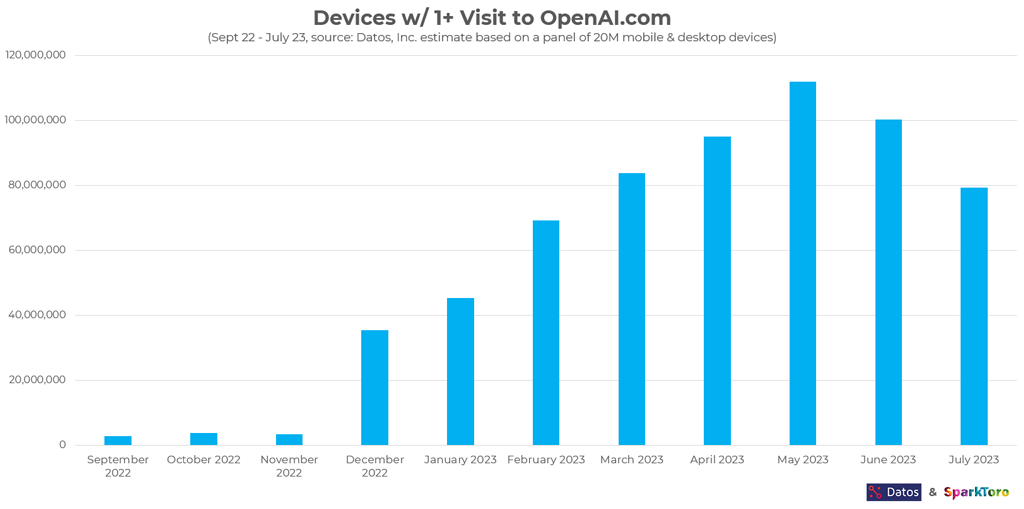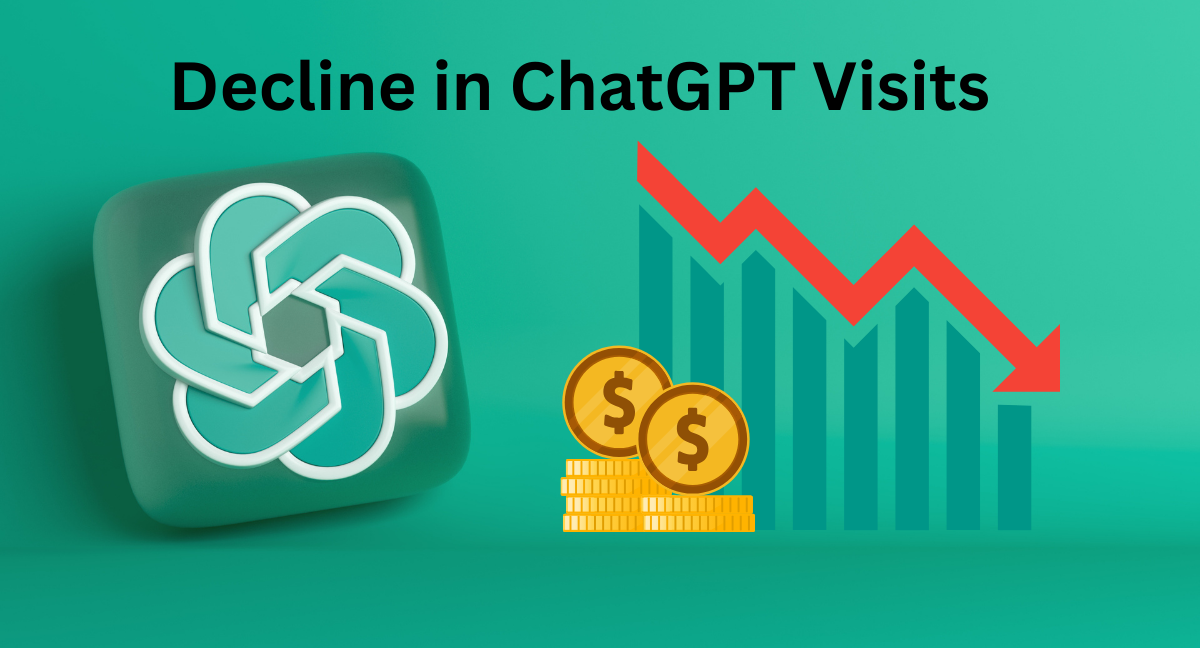ChatGPT has become the talk of the town. Its omnipresence in tech discussions, mainstream media, and professional conversations across diverse fields raises intriguing questions. How will it impact your work? Will AI eventually replace you? Are professionals like Hollywood writers, real estate agents, dog walkers, and anesthesiologists still relevant in a world dominated by AI?
Rand Fishkin, in collaboration with Datos, embarked on a fascinating journey to demystify some of the enigmas surrounding ChatGPT. The quest began with a single question: Is ChatGPT's usage on the rise or on the decline?
Mystery behind the decline in ChatGPT visits
If you've been swept away by sensational headlines proclaiming exponential growth in ChatGPT's usage, you're not alone. However, the more discerning observer might have stumbled upon recent reports suggesting a different story. Rand Fishkin delved into the numbers, and the findings were intriguing.
Since May, OpenAI's website traffic has witnessed a significant decline of 29.15%. But before jumping to conclusions, two compelling theories emerge:
Theory A: Professional users are still active or growing, while a decline is observed mainly among new users or those exploring ChatGPT without specific tasks.
Theory B: A substantial portion of usage is linked to educational purposes, particularly in regions with summer vacations, such as the US and Canada.
To shed light on these theories, Datos provided valuable insights based on the browsing behavior of millions of devices in their opt-in, anonymized panel. The breakdown of visits per month since September 2022 painted a revealing picture:

The data shows a decline in 1-2X/month visitors, which is in line with Theory A. However, this theory starts to crumble when we examine devices with 3-10 visits/month and 11+ visits/month, both of which have experienced noticeable declines since May. In fact, the decline in the 11+ visit/month category began as early as April.
This points us toward Theory B, which suggests educational users might be responsible for the decline. But the story doesn't end there. Rand Fishkin digs deeper into the data.
What Are People Asking ChatGPT to Solve?
Are students turning to ChatGPT for their office tasks? Or is ChatGPT replacing Google Search, software programmers, or even storytellers at role-playing game tables? To unravel these mysteries, Datos provided Rand with over 7,000 real user prompts, filtered down to 4,098 credible and relevant ones.

The distribution of prompts per session reveals an almost even split between single prompt, 2-4 prompt, and 5+ prompt sessions. But what tasks are these prompts driving? Utilizing ChatGPT's own topic classification system, Rand categorized the prompts into top-level use cases:

- Programming Assistance: The largest use-case, constituting 29.14% of all prompt series. ChatGPT excels in helping users with programming tasks, from writing code to error checking.
- Education: Including personal knowledge, interest pursuits, and professional knowledge for work purposes. This category accounts for a significant portion of usage.
- Content Creation: A broad category encompassing personal and professional content creation tasks, such as writing blog posts or crafting role-playing game adventures.
- Sales and Marketing: Focused on tasks like analytics analysis, channel selection, ad optimization, and messaging assistance.
To go further into the analysis, subcategories were examined:
- Higher ed, primary ed, and homework made up around 10% of all use cases, but this alone couldn't explain the 29% decline in traffic since April/May.
Surprisingly, the most common words in ChatGPT prompts revealed intriguing insights:
- "Write," "Create," and "List" were expected verbs.
- "SEO" appeared in 2.39% of sessions, hinting at a significant SEO-related demand.
- "Game" surfaced in 4.66% of sessions, showcasing the unexpected role of ChatGPT in gaming.
Other surprising findings included mentions of "Judge," "SaaS," "Pricing," "Curriculum," "Employment," "Employer," "Attorney," "Lawyer," "Tweet," "Movie," "DnD," and "RPG."
This journey of discovery wouldn't have been possible without the invaluable contributions of Datos and the dedicated efforts of the DataSci101 and Vayda teams.
For those curious about Datos, they stand as the leading Data-as-a-Service (DaaS) provider of privacy-compliant clickstream datasets globally. Their comprehensive data feeds cover various online behavioral actions, fueling insights across industries.
The future revelations brought by SparkToro V2 will leverage Datos' exceptional data as one of its core pillars. The world of AI continues to evolve, and its impact on our lives and professions remains a captivating narrative.
Read More:

We research, curate, and publish daily updates from the field of AI. A paid subscription gives you access to paid articles, a platform to build your own generative AI tools, invitations to closed events, and open-source tools.
Consider becoming a paying subscriber to get the latest!




